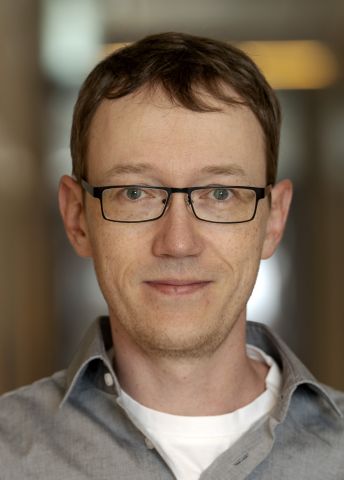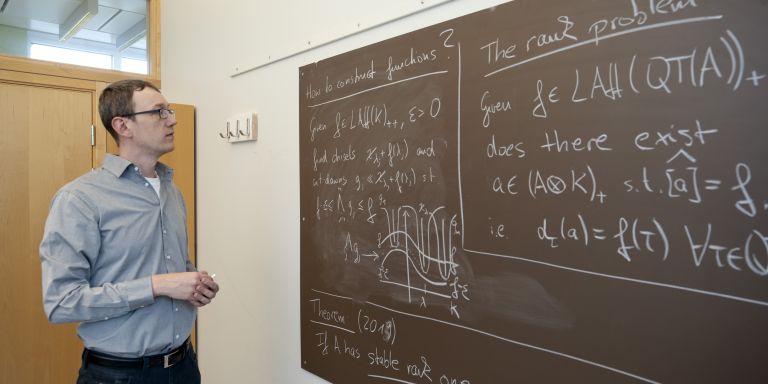
Hannes Thiel
Assistant Professor of Analysis
Wallenberg Academy Fellow 2021
Institution:
Chalmers University of Technology
Research field:
Operator algebras


Wallenberg Academy Fellow 2021
Institution:
Chalmers University of Technology
Research field:
Operator algebras
By classifying different objects, researchers create order that contributes to new knowledge. For example, the classification of chemical substances in the Periodic Table resulted in better understanding of the properties of the elements, and Carl Linnaeus’ classification system for plants and animals is considered to be the basis of modern biology.
Classification also plays a key role in mathematics. Here, classes are defined based on differences and similarities between mathematical objects and the mathematical properties of objects described.
As a Wallenberg Academy Fellow, Thiel works with the classification of a type of mathematical object known as operator algebras. They were created in the 1930s by physicist and mathematician John von Neumann, because he wanted a mathematical tool to make calculations in the then new field of quantum mechanics.
“Operator algebras are the mathematical foundation of quantum mechanics; you need them to calculate high-energy physics, for example. In recent years, it has been established that they can also be used in quantum information, where the development of quantum computers is a popular application,” says Thiel.
Thiel’s research relates to a type of operator algebras known as C*-algebras – an area he has worked on throughout his career, although purely by chance. As an undergraduate, Thiel did an exchange semester at the University of California, Berkeley, in the US. When the course he had planned to take was cancelled, he was assigned to a course in C*-algebras instead.
“I was utterly fascinated! In algebra, you solve equations and get precise answers. In contrast, operators – it’s analysis, it’s all about estimates, more like the real world. Operator algebra connects these two things and I immediately found it extremely satisfying and beautiful.”
In the past five years, mathematicians have succeeded in classifying a certain family of C*-algebras known as Regular C*-algebras. There is a sort of book that lists all the C*-algebras and their properties. But this still leaves the problem of knowing whether a particular C* algebra is of this known type. Thiel uses moss to illustrate the problem.
“Imagine you’re walking in the woods and have a book about moss with you. You see a plant that looks like a moss and want to look up its characteristics, but first you need to know if it really is a moss. The same problem applies with C*-algebras. There are the Regular C*-algebras that we know all about, and then there are those that look like regular C*-algebras but aren’t, and we currently have no reliable way to tell them apart.”
Therefore, a test is needed to establish whether a C*-algebra is of the classified type or not. In 2005, two mathematicians formulated a method to do this, the so-called Toms-Winter conjecture. To date, other researchers have succeeded in proving this to be true in some special cases, but proving it in general is one of the great unanswered questions in operator algebra and the aim of Thiel’s research.
To succeed, Thiel must use new methods from order theory, which is about comparing objects and arranging them according to certain properties. Thiel became aware of order theory when he was a doctoral student. He has since developed these methods and has used them to solve C*-algebra problems that had long remained unsolved.
“There were plenty of sceptics when I started because order theory hadn’t been used to any great extent in operator algebra. But when I successfully solved several major problems, it proved that the concept works. Because I’ve been working with these methods for many years now, I have a good shot at being the first to solve this problem – verifying the Toms-Winter conjecture – as well.”
When we meet, Thiel has only been in Gothenburg for a couple of months. Prior to coming here, he was professor of analysis at Kiel University in Germany. He says that it was a difficult decision to leave Germany, where he grew up. But the advantages of moving to Gothenburg and Chalmers far outweighed the disadvantages.
“Here I get to devote a larger proportion of my time to research. It’s a fantastic opportunity. Thanks to my generous grant, I can employ a few people and I get access to a great network of researchers.”
There are several groups worldwide that are currently working on this problem. Within the next few years someone will come up with a solution and I’ve got a great chance of being the first to succeed.
Thiel is in the middle of setting up his workplace and working out how things work in his new hometown. He talks with infectious enthusiasm about Gothenburg’s efficient public transport system, something he values highly due to a visual impairment that means he cannot drive or cycle.
Another advantage is that there are three other researchers working on C*-algebras at the department; at his previous university he was the only one.
“It’s nice to have colleagues who understand your research. We’re a young and dynamic group here and there’s a great sense that we’re building something.”
Text Sara Nilsson
Translation Nick Chipperfield
Photo Johan Wingborg